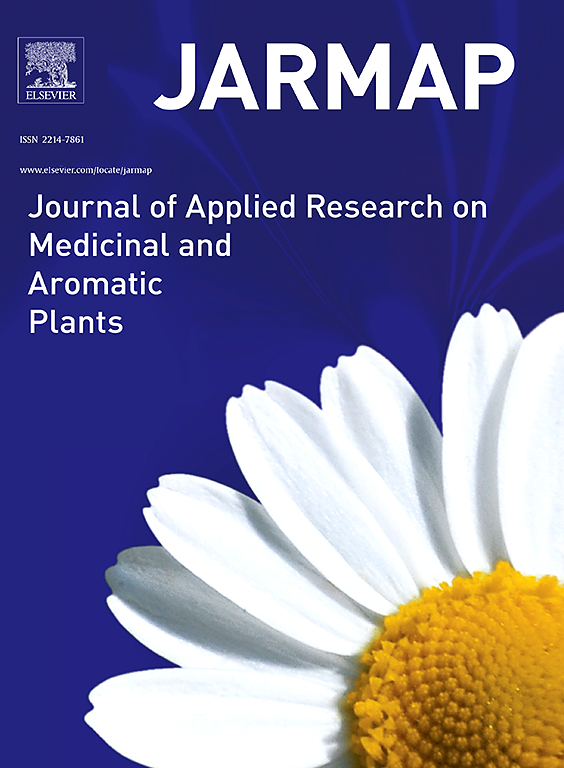秋水仙碱诱导甜马郁兰多倍体化
IF 3.6
2区 农林科学
Q1 PLANT SCIENCES
Journal of Applied Research on Medicinal and Aromatic Plants
Pub Date : 2025-10-10
DOI:10.1016/j.jarmap.2025.100669
引用次数: 0
摘要
甜马郁兰(Origanum majorana L.)是一种芳香植物,广泛应用于传统医药、食品、化妆品和制药行业。然而,全球变暖导致的不利气候条件对其生产力产生了负面影响。这一挑战可以通过开发更具耐受性的品种来解决。为了支持这一点,本研究评估了秋水仙碱诱导甜马郁兰多倍体的效果,目的是促进品种改良。秋水仙碱浓度分别为0.000 %、0.025 %、0.050 %、0.100 %、0.200 %、0.400 %和0.800 %,处理种子24 h。处理后的种子在离体萌发,并在温室条件下建立成活苗。所有温室植物的倍性状况首先通过气孔试验筛选,然后通过流式细胞术证实。结果表明:不同处理间种子发芽率(30 % ~ 46 %)差异不显著;但随着秋水仙碱浓度的增加,幼苗成活率下降,在0.400 %和0.800 %浓度下,无幼苗成活率。鉴定出17个推测多倍体,其中14个为真多倍体,3个为混合型多倍体。14个真正的多倍体包括2个三倍体,10个四倍体和2个五倍体。在0.025 %、0.050 %、0.100 %和0.200 %秋水仙碱诱导多倍体的效率分别为11.1 %、40 %、75 %和80 %。多倍体植株叶片较二倍体宽,气孔较大,气孔密度较二倍体低。真多倍体植物是培育甜马郁兰新品种的宝贵遗传资源。本文章由计算机程序翻译,如有差异,请以英文原文为准。
Colchicine induces polyploidization in sweet marjoram (Origanum majorana)
Sweet marjoram (Origanum majorana L.) is an aromatic plant widely used in traditional medicine, food, cosmetics, and pharmaceutical industries. However, unfavorable climatic conditions resulting from global warming negatively affect its productivity. This challenge may be addressed by developing more tolerant cultivars. To support this, the present study evaluated the efficacy of colchicine for inducing polyploidy in sweet marjoram, with the aim of facilitating cultivar improvement. Seeds were treated with colchicine at concentrations of 0.000 %, 0.025 %, 0.050 %, 0.100 %, 0.200 %, 0.400 %, and 0.800 % for 24 h. Treated seeds were germinated in vitro, and surviving seedlings were established under greenhouse conditions. The ploidy status of all greenhouse plants was initially screened by stomatal assay and subsequently confirmed by flow cytometry. Results showed that seed germination percentages (30 %-46 %) did not differ significantly among treatments; however, seedling survival declined as colchicine concentration increased, with no seedlings surviving at 0.400 % and 0.800 %. Seventeen putative polyploids were identified, of which fourteen were confirmed as true polyploids and three as mixoploids. The fourteen true polyploids included two triploids, ten tetraploids, and two pentaploids. The efficiencies of polyploid induction were 11.1 % at 0.025 %, 40 % at 0.050 %, 75 % at 0.100 %, and 80 % at 0.200 % colchicine. Compared with diploids, polyploid plants exhibited wider leaves, larger stomata, and reduced stomatal density. The true polyploid plants represent valuable genetic resources for breeding new sweet marjoram cultivars.
求助全文
通过发布文献求助,成功后即可免费获取论文全文。
去求助
来源期刊

Journal of Applied Research on Medicinal and Aromatic Plants
Pharmacology, Toxicology and Pharmaceutics-Drug Discovery
CiteScore
6.40
自引率
7.70%
发文量
80
审稿时长
41 days
期刊介绍:
JARMAP is a peer reviewed and multidisciplinary communication platform, covering all aspects of the raw material supply chain of medicinal and aromatic plants. JARMAP aims to improve production of tailor made commodities by addressing the various requirements of manufacturers of herbal medicines, herbal teas, seasoning herbs, food and feed supplements and cosmetics. JARMAP covers research on genetic resources, breeding, wild-collection, domestication, propagation, cultivation, phytopathology and plant protection, mechanization, conservation, processing, quality assurance, analytics and economics. JARMAP publishes reviews, original research articles and short communications related to research.
 求助内容:
求助内容: 应助结果提醒方式:
应助结果提醒方式:


